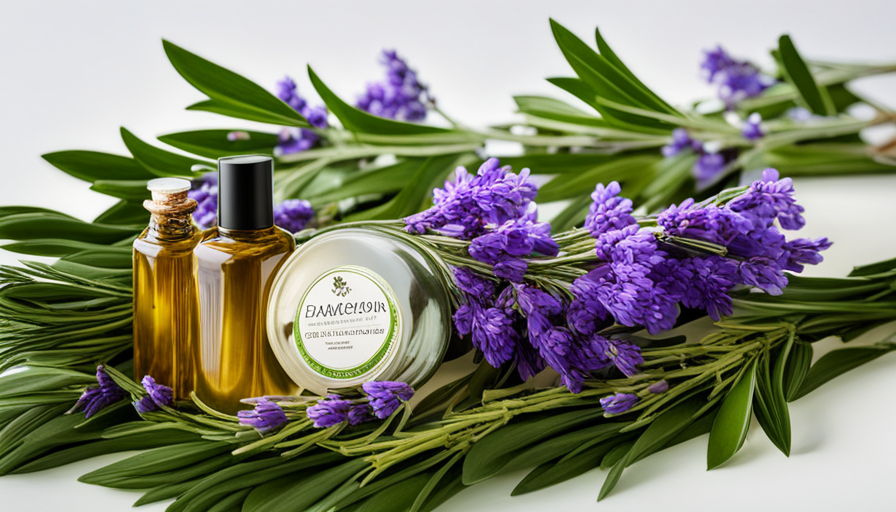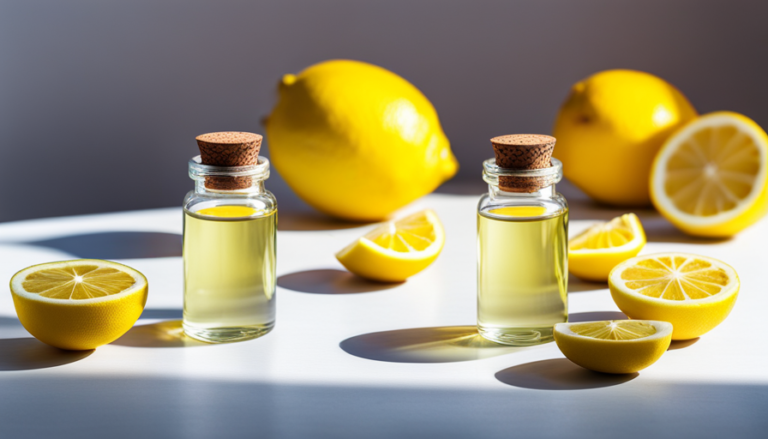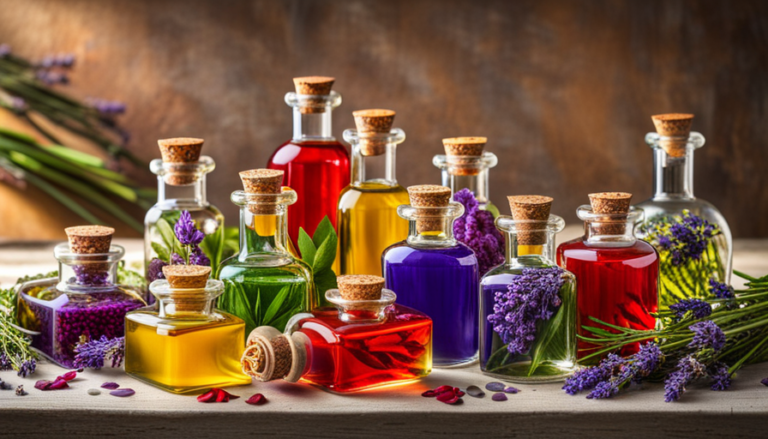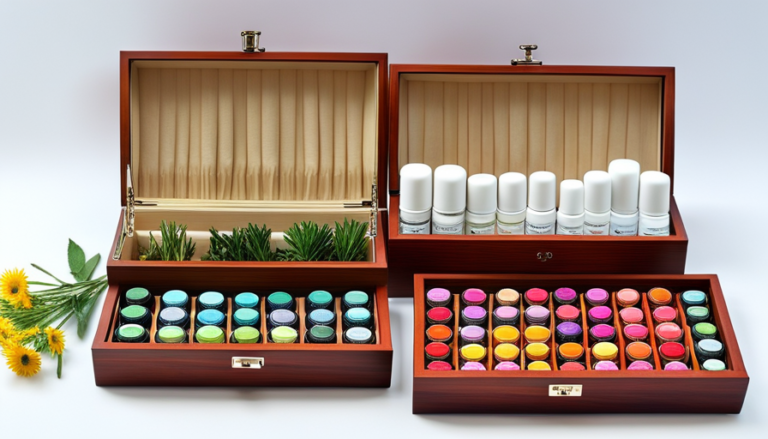Essential Oil Shampoo Recipes

Are you tired of using chemical-laden shampoos that leave your hair feeling dull and lifeless? It’s time to switch to a more natural alternative – essential oil shampoo.
By combining the power of essential oils with basic ingredients, you can create a personalized shampoo that not only cleanses your hair but also nourishes it from root to tip.
In this article, we will explore the benefits of using essential oil shampoo, guide you in choosing the right oils for your hair type, and provide easy-to-follow recipes for both basic and specialized blends.
Get ready to transform your hair care routine and achieve healthier, more vibrant locks.
Key Takeaways
- Essential oil shampoo can cleanse and nourish hair while providing aromatherapy benefits.
- Different essential oils offer specific benefits for different hair types, such as repairing split ends, hydrating hair, and eliminating dirt and grease buildup.
- A basic essential oil shampoo recipe involves adding 10 drops of essential oil per ounce of shampoo and mixing well before use.
- There are specialized essential oil shampoo recipes for color-treated hair and curly hair, which involve combining specific essential oils with other ingredients like unscented shampoo and coconut milk.
Benefits of Using Essential Oil Shampoo
Using essential oil shampoo can provide a variety of benefits for your hair and scalp. Not only does it cleanse and nourish your hair, but it also offers the aromatherapy benefits of essential oils. These natural oils have unique properties that can promote relaxation, reduce stress, and uplift your mood while you wash your hair.
Additionally, essential oil shampoo can help stimulate hair growth by improving blood circulation in the scalp and providing nutrients to the hair follicles. This can lead to stronger, healthier strands and potentially even faster hair growth.
Now that you understand the benefits of using essential oil shampoo, let’s delve into choosing the right essential oils for your specific hair type without further ado.
Choosing the Right Essential Oils for Your Hair Type
If you have dry and damaged hair, choosing the right essential oils can help restore moisture and repair your locks. Look for oils like argan, jojoba, or almond oil which are rich in vitamins and fatty acids that nourish and hydrate the hair.
On the other hand, if you have oily and greasy hair, essential oils like tea tree, lemon, or peppermint can help balance oil production and clarify the scalp.
Lastly, if you’re dealing with scalp conditions such as dandruff or itchiness, consider using essential oils like lavender, rosemary, or eucalyptus to soothe irritation and promote a healthier scalp.
Oils for Dry and Damaged Hair
To nourish your dry and damaged hair, try incorporating oils into your shampoo recipe. Oils such as argan, jojoba, and coconut are excellent choices for frizzy hair due to their moisturizing properties.
Argan oil is rich in vitamins and antioxidants that help repair split ends and restore shine to your hair.
Jojoba oil closely resembles the natural oils produced by our scalp, making it a great option for dry and damaged hair. It helps to hydrate and nourish the strands from within, reducing breakage and improving overall hair health.
Coconut oil is known for its deep conditioning abilities, providing intense moisture to dry locks and preventing further damage.
By adding these essential oils to your shampoo recipe, you can effectively combat dryness and promote healthy-looking hair.
Moving on to the next section about oils for oily and greasy hair…
Oils for Oily and Greasy Hair
For those with oily and greasy hair, incorporating oils into your hair care routine can help balance oil production and promote healthier-looking locks. While it may seem counterintuitive to add more oil to already oily hair, certain natural remedies can actually regulate sebum production and leave your scalp feeling refreshed.
Here are three homeopathic solutions that can effectively manage excess oil:
-
Tea tree oil: Known for its antibacterial properties, tea tree oil helps eliminate the buildup of dirt and grease on the scalp.
-
Peppermint oil: This invigorating essential oil has a cooling effect on the scalp, reducing excess sebum production and leaving you with a fresh sensation.
-
Lemon essential oil: With its astringent properties, lemon essential oil cleanses the scalp by removing built-up oils without stripping away natural moisture.
Now let’s explore how oils can address scalp conditions such as dandruff or itchiness in the next section.
Oils for Scalp Conditions such as Dandruff or Itchiness
Address scalp conditions such as dandruff or itchiness by incorporating oils into your hair care routine. Natural remedies can be highly effective in promoting scalp health and alleviating these issues.
Tea tree oil is a popular choice due to its antifungal and antibacterial properties, which help combat dandruff-causing yeast and reduce inflammation.
Lavender oil not only smells great but also has soothing properties that can calm an itchy scalp.
Peppermint oil provides a cooling sensation and stimulates blood flow, promoting a healthy scalp environment.
Rosemary oil is another excellent option as it helps to balance sebum production, reducing both greasiness and dryness.
By adding these essential oils to your shampoo or creating custom blends, you can tackle scalp conditions naturally while enjoying the therapeutic benefits they offer.
In the next section, we will discuss a basic essential oil shampoo recipe that you can easily make at home.
Basic Essential Oil Shampoo Recipe
Mix together the essential oils and shampoo for a basic recipe that will leave your hair smelling amazing. This customizable option is perfect for those looking to incorporate natural hair care into their routine.
Start by choosing a shampoo that suits your hair type and needs, whether it’s for oily scalp or dry ends. Then, select essential oils based on their specific benefits – lavender for soothing the scalp, tea tree for fighting dandruff, or rosemary for promoting hair growth.
Add about 10 drops of essential oil per ounce of shampoo and mix well. Shake the bottle before each use to ensure the oils are evenly distributed throughout the shampoo.
With this simple recipe, you can enjoy all the benefits of essential oils in your everyday hair care routine.
Now let’s move on to specialized essential oil shampoo recipes tailored to address specific concerns like frizz or damaged hair.
Specialized Essential Oil Shampoo Recipes
Let’s now explore some specialized shampoo recipes using essential oils to target specific hair concerns such as frizz or damaged hair. When it comes to color-treated hair, you want a shampoo that will protect and nourish your locks. Mix 10 drops of lavender essential oil, 5 drops of rosemary essential oil, and 1 cup of unscented shampoo in a bottle. This blend will help maintain the vibrancy of your color while adding shine and moisture.
For those with curly hair, a moisturizing shampoo is key to keep those curls defined and frizz-free. Combine 10 drops of peppermint essential oil, 5 drops of lavender essential oil, and 1 cup of coconut milk in a bottle. This mixture will hydrate your curls, enhance their natural bounce, and reduce frizz.
Here is a table summarizing the specialized essential oil shampoos for different hair concerns:
| Hair Concern | Essential Oils |
|---|---|
| Color-Treated Hair | Lavender, Rosemary |
| Curly Hair | Peppermint, Lavender |
Now that you have these specialized recipes at hand let’s move on to some tips for using essential oil shampoo effectively.
Tips for Using Essential Oil Shampoo
To effectively use your specialized essential oil shampoo, remember to apply a small amount to wet hair and gently massage it into your scalp. This will help distribute the shampoo evenly and ensure optimal absorption of the essential oils.
If you find that the scent is too strong or if you have sensitive skin, you can dilute the essential oils by adding a few drops to a carrier oil like coconut or olive oil before mixing it with your shampoo. This will help reduce any potential irritation or allergic reactions.
It’s important to note that while essential oils offer many benefits, they can also have side effects if used incorrectly. Some common side effects of using essential oil shampoo include skin irritation, redness, and dryness. If you experience any of these symptoms, discontinue use immediately and consult a healthcare professional.
Conclusion
So there you have it, a comprehensive guide to creating your own essential oil shampoo recipes.
By using these natural ingredients, you can experience the numerous benefits that come with incorporating essential oils into your hair care routine. Whether you’re looking to enhance hair growth, treat dandruff, or add shine and vitality to your locks, there’s an essential oil blend out there for you.
So why not give it a try and let nature work its magic on your hair? It’s time to say goodbye to commercial shampoos and hello to healthier, more vibrant tresses.
The possibilities are endless when it comes to creating personalized essential oil shampoo recipes – so start experimenting today! Let your imagination run wild as you mix and match different scents and oils tailored specifically for your hair type.
Remember, nature has provided us with powerful botanicals that can transform our hair in ways we never thought possible. Embrace the beauty of nature’s gifts and watch as your hair becomes a stunning masterpiece!






